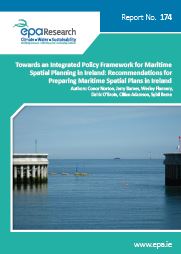Authors: Conor Norton, Jerry Barnes, Deiric O’Broin, Wesley Flannery, Cillian Adamson and Sybil Berne
Summary: There is a need for a holistic vision and management to allow for the balance of social, economic and environmental interests and to ensure that maritime space and resources are used in a planned and sustainable manner.

The use of the Irish marine space is increasing. As maritime activities intensify, there is increased competition for use of space and potential conflicts with other objectives such as the protection of the marine environment. Addressing governance issues and resolving conflicts between different stakeholders are increasingly important. There is a need for a holistic vision and management to allow for the balance of social, economic and environmental interests and to ensure that maritime space and resources are used in a planned and sustainable manner. This report outlines a holistic vision and management to allow for the balance of social, economic and environmental interests and to ensure that maritime space and resources are used in a planned and sustainable manner.
Maritime spatial planning (MSP) is a process by which state authorities analyse and organise human activities in marine areas to achieve ecological, economic and social objectives. It is the subject to the Maritime Spatial Planning Directive (2014/EC/89). The Directive has to be transposed by September 2016 and maritime spatial plans have to be in place by April 2021. There is a need adopt a coherent approach to the preparation of maritime spatial plans in an Irish context. The research outlined in this report will support policy implementation in this important area.
This research project seeks to develop a staged integrated approach for the preparation of maritime spatial plans in Ireland which will facilitate the management of maritime area in a sustainable manner. The staged approach ensures that a rational and consistent process is applied to the spatial plan-making processes. This approach facilitates a full understanding of the maritime environment and issues, allows for appropriate objective-setting and strategy development, provides a framework for drafting the plan and resolving conflicts, and allows for adoption and monitoring. As spatial planning is an on-going process within plan-making cycles, there is a review process which allows for revision and updating. Integration of plan-making, environmental assessment and consultation promotes broader acceptance by stakeholders, ensures a legally robust plan and effectively integrates environmental considerations and the ecosystem-based approach into plan preparation.
https://www.epa.ie/media/epa-2020/publications/research/Thumb174[1].jpg